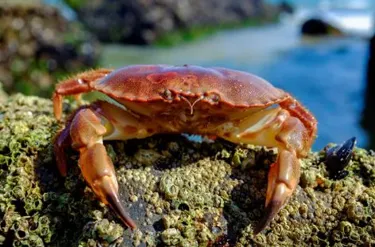BACK TO ROCK SCHOOL
- Friday 13th September 2024

Whilst the nation’s little ones get stuck back into the classroom after the holidays, SEA LIFE London Aquarium has proved that every day is a school day as its team of expert Aquarists aim to educate the country on a favourite UK pastime – rock pooling.
Research commissioned by SEA LIFE London Aquarium found that a third (33%) of UK adults said one of their favourite things to do with their family was to visit the seaside, with 53% saying they loved enjoying all the beach has to offer.
With so much love for the seaside, it comes as no surprise that one in nine (11%) Brits said their favourite things to do on the UK’s 18,000 miles of coastline was to indulge in the pastime of rock pooling.
In fact, 76% have fond memories of going rock pooling as a child and more than half (52%) of parents have been rock pooling before, with a third (33%) admitting the best part is the weird and wonderful creatures you can find.

Rock pooling is a brilliant hands-on activity that introduces children to a unique habitat, and brings the learning experience into the real world as 7 in 10 respondents (70%) agree rock pooling can help young people learn about conservation, with creatures such as crabs, barnacles, starfish and more to be found.
But despite rock pooling’s popularity, only 31% of UK adults were able to identify seaweeds, and a whopping 66% couldn’t name sea urchins. What’s more, one in five (22%) admitted to not knowing to wait until low tide to rock pool.
With Great British Beach Clean week nearly upon us, SEA LIFE London Aquarium’s Aquarist, Elise de Tourtoulon-Adams details where Brits should head for the ultimate rock pooling experience after their litter-picking, and her top tips for how to rock pool successfully and safely, which includes using the Seashore Code:
- Be prepared and don’t forget your equipment: I recommend taking a clear bucket or Tupperware that you can dip into the rock pool. Learn some key species beforehand or bring an ID guide to help you identify and find cool facts about the wonderful creatures you discover
- Wear appropriate clothing and footwear: Make sure you wear appropriate clothing for the weather and don’t forget to wear sensible sturdy footwear as the rocks can be uneven and slippery
- Observation is key: Try to avoid touching the rockpool creatures if you can, you get the opportunity to see so much more when you just watch the rockpool come to life without disturbing it. Carefully turn over stones to see what is hiding underneath, but make sure to put them back where you found them
- Safety first: Check the tides beforehand, and always be aware of the water around you in case the tide turns suddenly. Always carry a mobile phone just in case you get into any trouble - I keep mine in a dry bag or waterproof pouch! And be aware of species than can sting or bite, most commonly found in the UK are snakelocks anemones and weaver fish which are venomous
- Have fun: The most important part of the rock pooling experience is to have fun! It’s a great bonding activity and a way to see creatures up close and personal. You can take photos and learn more about the creatures when you get home!

Whilst rock pooling is a family fun activity, they also play a crucial role in marine conservation. Rock pools are formed when the tide goes out and leaves water behind. The creatures that live in them need to be tough to stand up to crashing waves and changing temperatures.
But with our changing climate and the dangers that come with it, these unique ecosystems could be under threat. 68% of those polled admitted to being worried about the future of marine life, whilst over of third (36%) believe rockpools are under threat.
Elise commented: “Irresponsible rock pooling is one of the biggest threats to this pastime, so I would always recommend following the Seashore Code. More broadly, species that inhabit rock pools have varying levels of heat tolerance due to the long sun exposure times when the tides go out. However, an increase in global temperatures will cause even higher temperature extremes, so there’s a chance this rise will affect rockpool species and their ability to adapt.”
SEA LIFE London Aquarium, situated on the South Bank, is open seven days a week. For the latest opening times, feeding times, prices and more see http://www.visitsealife.com/london/